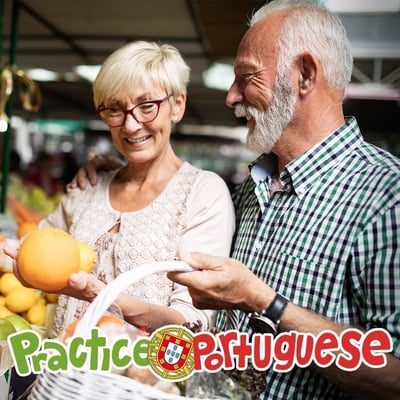We've unlocked the Premium Features for this special episode! Members get access to features just like this across our entire library. Learn More
- 00:00:00Intro
- 00:00:55Section 1
- 00:02:04Section 2
- 00:03:31Section 3
- 00:06:04Section 4
- 00:07:19Transition to Explanations
- 00:07:40Section 1
- 00:08:47Section 1 Discussion
- 00:11:32Section 2
- 00:12:56Section 2 Discussion
- 00:16:47Section 3
- 00:19:20Section 3 Discussion
- 00:23:22Section 4
- 00:24:33Section 4 Discussion
- 00:27:48Adeus!
Please request our permission before redistributing these files.
- Rui: Hello everybody!
- Joel: Hello everybody!
- Rui: Before we start we want to say... this is like a disclaimer?
- Joel: Yeah… a little disclaimer. It's really late when we're recording this and we don't
- want to anger the neighbours too much.
- We don't want to "chatear" the neighbours. Rui: It's a quarter to 1 a.m.
- Joel: And we're recording this episode because there wasn't another time that we could schedule it!
- That's why, if we sound like late night radio announcers with soft smooth voices, it's because
- we just want not to talk to loud.
- So as usual, we'll hear the whole dialogue all the way through one time and then after
- we will break it down into sections to discuss some of the vocabulary and expressions and
- grammar... and all that other good stuff.
- Rui: And this being said… let's start with the episode!
- Joel: Not recommended to listen to while driving…
- Rui: (Jibberish!)
- Desaparecido No Concerto O João e o Fred são dois amigos adolescentes.
- O João é português e o Fred é canadiano.
- Os jovens são amigos desde que a família do Fred se mudou para Portugal.
- Depois de um ano, o Fred aprendeu a falar Português e foi estudar para a mesma turma do João.
- Ambos gostam muito de música e, no verão, vão aos concertos e festivais que acontecem
- por todo o país.
- O ano passado, no último ano do ensino secundário, pegaram nas mochilas, na tenda e no dinheiro
- que juntaram durante o inverno e foram para a Costa Vicentina, no litoral alentejano,
- assistir ao Festival Sudoeste.
- Na primeira noite que chegaram, estava a tocar uma banda de que os dois gostavam muito.
- A noite estava quente e a cerveja muito fresca e o João começou a beber.
- João: Toma Fred… bebe mais uma cerveja.
- Agarra nessa que eu vou buscar mais.
- Fred: Ei João, vai com calma! Não queremos ficar bêbados logo na primeira noite.
- João: Fred, o canadiano certinho, não vai beber demais… já percebi.
- Mas ainda bem porque alguém tem que tomar conta da tenda.
- Olha… eu vou buscar mais uma jola e para ti vou procurar um chá de camomila, se encontrar…
- Até já.
- Fred: Vai… eu fico aqui.
- Depois de um tempo, o Fred reparou que o João ainda não tinha voltado.
- O Fred achou que era normal, porque o festival estava cheio de gente e as filas para a cerveja
- eram enormes, mas o tempo passou e o João não apareceu.
- A banda terminou de tocar eram 4h da manhã e não havia sinal do João.
- Preocupado, o Fred começou a procurar o amigo.
- Chamou pelo seu nome, procurou-o nas outras tendas, procurou-o até fora do recinto do
- festival, mas não o conseguiu encontrar em lado nenhum.
- Sem saber mais o que fazer, foi ao posto da polícia mais próximo pedir ajuda.
- Fred: Boa noite, senhor guarda. Eu estou no Festival do Sudoeste com o meu amigo João
- e ele desapareceu há mais de 4 horas.
- Foi buscar uma bebida e não regressou.
- Guarda: Boa noite!?
- Já viu que horas são?
- Isto são horas de acordar um agente da polícia?
- Fred: Oh desculpe… não sabia que estava a dormir, mas…
- Guarda: Bem… eu não queria dizer acordar… eu queria dizer incomodar.
- Acha que um agente da autoridade dorme em serviço?
- Fred: Não, claro que não.
- Mas e então o meu amigo?
- Ó rapaz, é todos os anos a mesma conversa!
- Nesta altura do ano, durante o festival, é raro o adolescente que vai dormir à sua própria tenda.
- Não sei se entendeu o que eu quis dizer...
- Fred: Mas sabe, o meu amigo...
- Guarda: E antes que continue, posso dizer-lhe já que tem que preencher ali um impresso
- e depois esperar até falar com o responsável por essas situações.
- O Fred preencheu o impresso e sentou-se.
- Cinco minutos depois foi chamado a um outro balcão, por uma voz que parecia familiar.
- Guarda: O senhor, aqui por favor!
- Diga lá o que aconteceu.
- Fred: Mas… sou eu… lembra-se de mim?
- Falamos há cinco minutos.
- Lembra-se?
- Guarda: Eu não faço as regras.
- Por favor descreva a situação do início e devagar, para o meu colega poder apontar
- tudo no seu caderno de notas.
- E dessa forma o Fred explicou o desaparecimento do João – de novo.
- Guarda: Ainda não passaram 48 horas.
- Não podemos dar o seu amigo como desaparecido.
- Fred: Eu sei, senhor Guarda.
- Mas ele bebeu demais e estou com medo que lhe tenha acontecido alguma coisa.
- Não nos pode ajudar?
- Guarda: Não, infelizmente temos de esperar 2 dias antes de poder agir.
- Vá, agora deixa-me voltar ao dormitório… ai!...
- …Ao relatório!
- Relatório!
- O Fred voltou para a tenda e ao fim de umas horas adormeceu.
- Acordou novamente por volta das 10h da manhã com o barulho de alguém a tentar abrir a tenda.
- Fred: João!
- És tu!
- Onde andaste?
- Passei a madrugada à tua procura. Até fui à polícia.
- Que susto pá!
- João: Calma!
- Não aconteceu nada.
- Eu fui à procura de cerveja e fiquei com fome.
- Queria comer um pão com chouriço.
- Como não encontrei aqui no festival, fui à procura de um supermercado.
- Fred: João, mas já passava da meia-noite.
- Estavas à espera de encontrar algum supermercado aberto?
- A essa hora está tudo fechado.
- João: Estava com fome… muita fome.
- E como se diz em Português: “o que tem que ser, tem muita força”… ou “a esperança…
- … é a última a morrer”.
- Fred: Bem… neste caso a última coisa a morrer foi a tua fome.
- Estavas bêbado… isso sim!
- De qualquer forma, são 10h da manhã!
- Onde andaste até agora?
- João: Já te disse.
- Fui ao supermercado… e o supermercado só abre às 9 da manhã!
- “Duh”… achas que os supermercados estão abertos durante a noite?
- Fred: Hum… ok… pois… vamos à praia.
- Joel: So now that you've heard the story of Joel and Fred… 2 very fictional characters,
- one Canadian, one Portuguese… we're going to break down some of the sections of this
- episode to talk about some of the vocabulary and the "expressões" that were used.
- Rui: Break it down!
- Joel: Break it down ( epic radio station transition ).
- So, Section 1 –
- Rui: Desaparecido No Concerto
- O João e o Fred são dois amigos adolescentes.
- O João é português e o Fred é canadiano.
- Os jovens são amigos desde que a família do Fred se mudou para Portugal.
- Depois de um ano, o Fred aprendeu a falar Português e foi estudar para a mesma turma do João.
- Ambos gostam muito de música e, no verão, vão aos concertos e festivais que acontecem
- por todo o país.
- O ano passado, no último ano do ensino secundário, pegaram nas mochilas, na tenda e no dinheiro
- que juntaram durante o inverno e foram para a Costa Vicentina, no litoral alentejano,
- assistir ao Festival Sudoeste.
- Na primeira noite que chegaram, estava a tocar uma banda de que os dois gostavam muito.
- A noite estava quente e a cerveja muito fresca e o João começou a beber.
- Rui: So João and Fred, they are two teenager friends.
- And one is Portuguese, the other one is Canadian… they are friends since the family of Fred
- moved to Portugal.
- And after one year learning Portuguese, Fred went to the same class as João.
- They both like music, so in the summer they go to the concerts and festivals around the country.
- Last year, it was their last high school year, so they grabbed their backpacks, their tents
- and the money that they earned during the winter and they went to Alentejo, to this music
- festival called Festival Sudoeste.
- The first night, the band was amazing, night was warm, the beer was cold and João, the
- Portuguese, started drinking.
- Joel: Uh-oh...
- Rui: Yeah.
- Joel: In here, we're got the word "pegar" in the phrase "pegaram nas mochilas".
- They grabbed their backpacks. Rui: Yeah… it's like grab and move.
- It's like you grab something and you move.
- It's a verb that Brazilians use a lot.
- We [Portuguese] usually, instead of "pegar", we say “agarrar”, "apanhar".
- Joel: So when Portuguese use it, it's more when you're grabbing something to go.
- Whereas I guess Brazilians will use it if they're just grabbing it to hold onto, even.
- Rui: Yeah… they will use it whenever we say "apanhar", they say "pegar".
- And we only use "pegar" in this context, [when] you grab the backpack and go.
- Joel: The next phrase "no litoral alentejano".
- Rui: Yeah… like the coast of Alentejo region. Joel: So that's almost a false cognate or
- "falso amigo", because "litoral" almost looks like literal but it means "the coast".
- And then the next word in the section, "assistir" is another "falso amigo" because it looks
- like a word in English, "to assist".
- But it's not the same in Portuguese because "assistir" means "to watch", like you're watching
- a show or you are being a bystander in something.
- Rui: Yeah… in Portugal, it's specifically for when you are… like… when you're part of
- an audience.
- Because when you are watching TV, you say "estou a ver televisão", which is funny because
- Brazilians use "assistir" for "televisão" as well.
- So they don't say "ver televisão"… they say "assistir televisão".
- And for us it's… "assistir” is a little bit more specific.
- Like when there's something going on and you are part of an audience.
- Joel: Okay… Rui: That's interesting.
- Joel: Let's move onto section 2.
- João: Toma Fred… bebe mais uma cerveja.
- Agarra nessa que eu vou buscar mais.
- Fred: Ei João, vai com calma. Não queremos ficar bêbados logo na primeira noite.
- João: Fred, o canadiano certinho, não vai beber demais… já percebi.
- Mas ainda bem porque alguém tem que tomar conta da tenda.
- Olha… eu vou buscar mais uma jola e para ti vou procurar um chá de camomila, se encontrar…
- Até já.
- Fred: Vai… eu fico aqui.
- Depois de um tempo, o Fred reparou que o João ainda não tinha voltado.
- O Fred achou que era normal, porque o festival estava cheio de gente e as filas para a cerveja
- eram enormes, mas o tempo passou e o João não apareceu.
- A banda terminou de tocar eram 4h da manhã e não havia sinal do João.
- Preocupado, o Fred começou a procurar o amigo.
- Chamou pelo seu nome, procurou-o nas outras tendas, procurou-o até fora do recinto do
- festival, mas não o conseguiu encontrar em lado algum.
- Sem saber mais o que fazer, foi ao posto da polícia mais próximo pedir ajuda.
- Rui: So, in section 2, João wants to give another beer to Fred who doesn't accept it.
- He doesn't want to get drunk in the first night.
- João makes fun of Fred… like… aw… you are so lame, you don't want to drink too much… okay…
- I got it.
- And so he goes and gets another beer and makes a joke… like… he's going to get Fred a
- chamomile tea.
- And Fred just stays where he is.
- But then time goes by and João doesn't show up.
- And the band finishes playing and Fred doesn't know nothing about João, so he gets worried.
- He starts looking for him, calling his name.
- He goes even outside the festival but he can't find him, so he ends up going to the police
- station to ask for help...
- Joel: Sounds like a good idea...
- Rui: Yeah... he's worried!
- Joel: So here we have the verb that we were talking about before, "agarrar", in the phrase...
- Rui: Yeah… "agarra nessa [cerveja] que eu vou buscar mais."
- This is much more common than "pega[r]".
- Like… "pega nesta cerveja" would be weird so we say "agarra[r]".
- Joel: Agarrar.
- Rui: To hold.
- Joel: And the next word... "bêbados".
- Rui: This is a word that you had a really hard time [with].
- I remember that for an entire year, I would make fun of you because you would say "bebidos."
- I think because of the word "bebida"...
- Joel: Yeah… just first off, this means drunk.
- "Bêbados" is drunk – Or... two people who are drunk.
- Rui: Yeah… "bêbado".
- Joel: Or "bêbada" if you're a woman.
- Rui: So it comes from the word "beber", to drink.
- But, the second vowel is an "A".
- And you would always – Or you would say "bebidos", with an "i" on the second vowel,
- or you say "Bêbedos" with an "e" [or bêbados].
- Joel: Yeah… because it almost sounds like the past participle of "beber", which would be
- "bebida".
- "A cerveja foi bebida".
- But to be drunk is spelled differently.
- It's B-Ê (with a circumflex to make it a more open vowel sound) B-Ê-B-A-D-O-S.
- Rui: Yeah… "bêbados".
- Joel: So that's a tricky one to pronounce, but if you can nail the pronunciation people
- be pretty impressed I think... right?
- The next expression is one that you may or may not have seen before: "tomar conta de".
- Rui: Yeah… "tomar conta de". That's like to take care of something.
- That's an expression.
- And then do you know what the word "jola" is?
- When he says "vou buscar mais uma jola"?
- Joel: To be honest, I only know because you told me before we recorded the episode.
- I had to ask.
- Rui: Yeah… it comes from the word "cervejola", which is like a cute way of saying "cerveja".
- And then you just take the really important, "cerve-" and you...
- Joel: Scrap it!
- Rui: You end up with "jola".
- Joel: Huh!
- Rui: That's what young people say or people our age to be funny.
- Joel: "Olha puto, traz cá uma –"… No – "Hey meu, traz cá uma jola!
- Rui: Perfect, you're ready to go to a concert.
- Joel: And later we go on to talk about "o recinto do festival".
- "Cinto" in the word "recinto" looks like the word "belt", so that makes me think that maybe
- this is something that contains something.
- "Recinto".
- Rui: Yeah… it's the perimeter...?
- Joel: Yeah… the perimeter of the festival.
- Rui: Yeah… like the enclosed area of the festival, where the festival is happening.
- Joel: Alright… and with that I think I'm ready for Section 3.
- Fred: Boa noite, senhor guarda. Eu estou no Festival do Sudoeste com o meu amigo João
- e ele desapareceu há mais de 4 horas.
- Foi buscar uma bebida e não regressou.
- Guarda: Boa noite!?
- Já viu que horas são?
- Isto são horas de acordar um agente da polícia?
- Fred: Oh desculpe, não sabia que estava a dormir, mas…
- Guarda: Bem… eu não queria dizer acordar… eu queria dizer incomodar.
- Acha que um agente da autoridade dorme em serviço?
- Fred: Não, claro que não.
- Mas e então o meu amigo?
- Guarda: Ó rapaz, é todos os anos a mesma conversa!
- Nesta altura do ano, durante o festival, é raro o adolescente que vai dormir à sua própria tenda.
- Não sei se entendeu o que eu quis dizer...
- Fred: Mas sabe, o meu amigo...
- Guarda: E antes que continue, posso dizer-lhe já que tem que preencher ali um impresso
- e depois esperar até falar com o responsável por essas situações.
- O Fred preencheu o impresso e sentou-se.
- Cinco minutos depois foi chamado a um outro balcão, por uma voz que parecia familiar.
- Guarda: O senhor, aqui por favor!
- Diga lá o que aconteceu.
- Fred: Mas… sou eu, lembra-se de mim?
- Falamos há cinco minutos.
- Lembra-se?
- Guarda: Eu não faço as regras.
- Por favor descreva a situação do início e devagar para o meu colega poder apontar
- tudo no seu caderno de notas.
- E dessa forma o Fred explicou o desaparecimento do João – de novo.
- Guarda: Ainda não passaram 48 horas.
- Não podemos dar o seu amigo como desaparecido.
- Fred: Eu sei, senhor Guarda.
- Mas ele bebeu demais e estou com medo que lhe tenha acontecido alguma coisa.
- Não nos pode ajudar?
- Guarda: Não, infelizmente temos de esperar 2 dias antes de poder agir.
- Vá… agora deixa-me voltar ao dormitório… ai!...
- …Ao relatório!
- Relatório!
- O Fred voltou para a tenda e ao fim de umas horas adormeceu.
- Acordou novamente por volta das 10h da manhã com o barulho de alguém a tentar abrir a tenda.
- Rui: OK… Section 3 is the conversation between Fred, the "canadiano", and the police officer, so
- he's like… obviously he's… he's worried and he goes to the police station in order to
- find some help.
- And the police station is empty at that time. The police officer is sleeping but he doesn't
- want to admit it.
- So he pretends that he is just working.
- Fred asks for help, and the guy doesn't seem very helpful because he says that every year
- it's the same conversation.
- Teenagers just disappear from the festival.
- Fred insists he wants help.
- So the police officer tells him to fill in the paper and wait – which is very typical
- from Portugal.
- Fred does that and he ends up being called by... the same guy… so!
- Joel: So… it's like he just wants to… the guard just wants to get Fred into the system so that he…
- Rui: He has to respect the system, has to respect the rules even though there's no one there.
- It's 4 a.m.
- Anyway.
- He ends up telling him that no… he can't help him.
- After all this work, he can't help… help, because he needs to be missing for 48 hours.
- Joel: He just wants to go back and have a nap.
- Rui: No… his "report"… he wants to do his report.
- Joel: Because near the end of this section, there's a little bit of a play on words between
- "dormitório" and "relatório".
- Rui: Yeah… "dorm" and "report".
- Joel: The guard said 'okay now… let me go back and go to my bed - I mean – the report!
- ‘The report!'
- "Relatório".
- But, let's rewind and go back to the beginning of this section.
- One thing that stood out for me is that in English, when we write the sound "ohhhh" like
- you're discovering, something or you're...
- Rui: Or like "ahhhh" or...
- Joel: Yeah… we'll usually use "H's".
- We'll write "oh" or "ah".
- But here, "Ó" is just simply a capital Ó with the accent on the...
- Rui: Yeah… because we don't do the aspiration like you do… "hhhha", like you the "H", right?
- Joel: If there's an "H" in Portuguese, it's usually going to be silent.
- Rui: Completely silent. So for us doesn't make any sense to write it "Ó" with an accent,
- or "Á" with an accent.
- Joel: Just to show that it's more open.
- Rui: "Á," "Ó", "Ó, por favor”, "Á"...
- Joel: And that's actually a great way to remember that when you're reading words and you see
- that accent… then it means to open your mouth more, in general, right?
- Rui: Very good advice. Joel: (Laughs) I don't need your sarcasm.
- But what I do need is help with this next phrase.
- Rui: Which is...
- Joel: We have the sentence: "Não podemos dar o seu amigo como desaparecido".
- So I guess the expression by itself would be "dar como".
- Rui: Yeah… "dar como".
- "Dar como" is "consider".
- We can consider your friend missing.
- Joel: Those are... just so it's clear for those listening, "dar" = to give and "como"-
- Rui: "As". Joel: Or "like".
- Rui: We also use that, for example, in "dar como garantido".
- Consider it done… won.
- Joel: So, "to consider" = "dar como"... "dar como explicado!"
- Rui: Esta frase pode ser dada como explicada!
- Joel: Alright!
- And the next word, "agir".
- Rui: It's a verb… "to act".
- Joel: And it's used a lot...
- Rui: Yeah… because it sounds better than "atuar".
- "Atuar" for us is very much...
- Joel: Theatrical Rui: Related to acting.
- And whenever it's not an actor, we use the verb "Agir".
- "Eu agi, tu agiste, eu ajo”. Joel: Ah… to spring into action, to act.
- Rui: To do something.
- Joel: Let's move on. Rui: Section 4 ( epic drum fill transition)
- Fred: João!
- És tu!
- Onde andaste?
- Passei a madrugada à tua procura. Até fui à polícia.
- Que susto pá!
- João: Calma!
- Não aconteceu nada.
- Eu fui à procura de cerveja e fiquei com fome.
- Queria comer um pão com chouriço.
- Como não encontrei aqui no festival, fui à procura de um supermercado.
- Fred: João, mas já passava da meia-noite.
- Estavas à espera de encontrar algum supermercado aberto?
- A essa hora está tudo fechado.
- João: Estava com fome… muita fome.
- E como se diz em Português: “o que tem que ser, tem muita força” ou “a esperança
- é a última a morrer”.
- Fred: Bem… neste caso a última coisa a morrer foi a tua fome.
- Estavas bêbado, isso sim!
- De qualquer forma, são 10h da manhã!
- Onde andaste até agora?
- João: Já te disse.
- Fui ao supermercado e o supermercado só abre às 9 da manhã!
- “Duh”… achas que os supermercados estão abertos durante a noite?
- Fred: Hum… ok… pois… vamos à praia.
- Rui: In section 4... guess who shows up at 10 a.m.!
- João shows up like nothing happened and Fred is like "where were you, it's 10 a.m."?
- Joel: "Que lata!"
- Rui: I know… and he's like… 'well,
- nothing happened, I wanted to eat bread with chorizo, and I didn't find it in the festival,
- so I went and looked for it in the supermarket.
- And Fred's like… it was after midnight!
- Where were you expecting to find a supermarket open?
- Joel: This must have happened before the time of cell phones, because he could have just
- called him.
- Rui: Well… you know what?
- In these festivals, there is no signal.
- Joel: Ooookay, it's in the middle of "o campo", the country[side].
- Rui: So he's like… 'I mean… midnight!
- Do you think there is any supermarket open at midnight!?'
- And he's… the other friend says… 'ah, well you know, I was hungry', and [Fred]…
- But it's 10am! Where were you until now?
- 'Well, the supermarket only opens at 9! Do you think supermarkets are open during the night?'
- 'Yeah… well… ok".
- The friend kind of gives up. 'Let's go to the beach.'
- Joel: We've got a couple great expressions here near the end.
- And I would like you to read them to us, Rui!
- Rui: One of them is "o que tem que ser, tem muita força."
- Joel: What has to be, has a lot of force!
- Rui: Which means… like… if you have to do something, you will probably do it. And... do you understand?
- Joel: Is he talking about fate or is he just talking about when someone is stubborn?
- Rui: No. When something is really important, you'll do it.
- "O que tem que ser"… meaning "O que tem que ser feito, tem muita força".
- So, for example, if you have to pee, you stop the car and pee behind a tree!
- And if someone tells you 'man, you're peeing behind a tree!'
- and you will answer, well… "o que tem que ser, tem muita força!"
- Joel: Is it like 'you gotta do what you gotta do!'
- Rui: "You gotta do what you gotta do". And "a esperança é a última a morrer". I think
- you have this in English. Joel: "Hope is the last to die...". We might
- have it, but it doesn't ring a bell. Rui: Well, it rings a bell for me!
- Joel: Hope is the last to die... "a esperança é a última a morrer".
- So in this context, what kind of feeling does that expression give us?
- Rui: Well… the friend was saying was that… 'yes, it was midnight, but he wanted to eat
- pão com chouriço". First of all, he really had to eat it so we went for it, and yes,
- it was midnight. Supermarkets are closed. But, the hope is the last to die! What if
- one of them was open?
- Joel: Ohhh… so it's – okay, I got you. So his hope was that the supermarket
- would be open. So you gotta do what you gotta do and...
- Rui: You gotta do what you gotta do… eat your pão com chouriço, and hope is the last to
- die. Let's hope there's a supermarket open. Joel: It would be like… "where there's a will
- there's a way?..." Maybe? I don't know, I'm going to –
- Rui: Maybe! That's like the both of them together… "where there's a will there's a way".
- Joel: Ohhhh!
- Well that was a fun little story, Rui. It's making me look forward to all of the festivals
- that are going to happen next summer!
- Rui: The summer is really over...
- Joel: So we can be happy because we can hide from the rain and stay inside and watch TV...
- Well that was a fun episode and I think I learned a few new expressions, and hopefully
- our listeners also learned a lot.
- (Laughs) We're just going to sit here until we know how to end the episode...
- Rui: Well… the episode is over... and so is
- the summer... on that note...
- Joel: So… signing off. This is Joel & Rui from
- practiceportuguese FM...
- PracticePortuguese.com.
- Smooooooth.
 We respect your privacy and have a ZERO TOLERANCE for spam.
We respect your privacy and have a ZERO TOLERANCE for spam.
















Oi Rui e Joel.
Mais um episodio ótimo. Eu aprendi muito. Se calhar “a esperança é a última a morrer” pode ser em inglês: ‘Where there’s life there’s hope’. ???
Obrigada
Sue Fletcher
Temos exacto a mesma expressão em alemão: “Die Hoffnung stirbt zuletzt.” Muito interessante. 🙂
great! thank you 🙂
Well done again! Love it!!
Hi Joel – the phrase you were looking for is a quote from Francois de la Rochefoucauld “Hope is the last thing that dies in man; and though it be exceedingly deceitful, yet it is of this good use to us, that while we are traveling through life it conducts us in an easier and more pleasant way to our journey’s end.” Some good and useful phrases in the lesson which we hear but perhaps miss because they are almost throw away lines. Rui did a good job of being a rural police officer – very believable. Perhaps a new calling? 🙂
Great episode, as always! I especially love Rui’s portrayal of the policeman.
Hi Guys,
Very much enjoyed this episode.
Slightly puzzled by the use of “nas”. “na” and “no” following the verb ‘pegaram’ in the following sentence:
O ano passado, no último ano do ensino secundário, pegaram nas mochilas, na tenda e no dinheiro que juntaram durante o inverno e foram para a Costa Vicentina, no litoral alentejano, assistir ao Festival Sudoeste.
Cheers
Declan
🙂
Hi Declan!
Well, in European Portuguese, the verb ‘pegar’ (to get, to grab…) is generally followed by the preposition ’em’. What happens here is that the preposition is contracted with the different definite articles that precede each noun. That is:
– pegaram em + as mochilas = pegaram nas mochilas
– pegaram em + a tenda = pegaram na tenda
– pegaram em + o dinheiro = pegaram no dinheiro
These contractions are great for simplicity and in this particular case, they’re actually mandatory (preposition + definite article).
Cheers,
Joseph
Right away I am going away to do my breakfast, later than having my breakfast coming yet again to
read more news.
Gostei muito do episódio. Obrigada! Só tenho um comentário: “litoral” não é um falso amigo! É um VERDADEIRO amigo, um cognato de verdade. “Littoral” in English means coastline or shore zone between high and low tides. 🙂 Carry on!
Ah you’re totally right! Thanks for pointing that out! You don’t hear the word “littoral” very often.